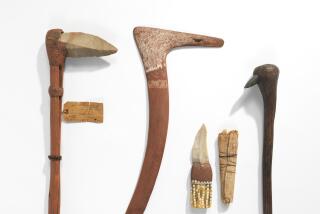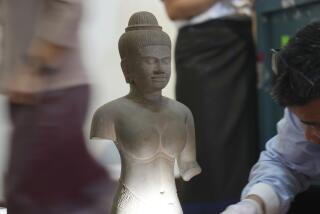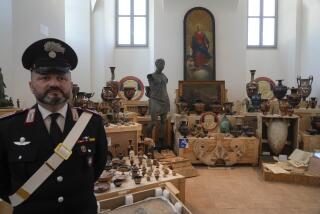Cooperation Between Israel, Egypt Still Far From Smooth
- Share via
CAIRO, Egypt — A precedent exists for returning antiquities uncovered in the Golan Heights if Israel and Syria achieve peace. But the path taken by Israel and Egypt was long, unpleasant and largely unsatisfying.
Pieces of the past excavated during Israel’s 15-year occupation of the Sinai peninsula eventually were returned to Egypt with great fanfare after sometimes contentious negotiations.
The last of the pottery, textiles, coins and other objects were turned over in December 1994--12 years after Israel withdrew from Sinai and 15 years after Egypt became the first Arab nation to make peace with Israel.
If Israel and Syria follow the course taken in the accord with Egypt, artifacts would be returned only after researchers finished studying them.
Sinai artifacts have remained off-limits in storage in Cairo since their return, although that appears to be changing.
A museum nearing completion in the Sinai town of el-Arish will exhibit some of the artifacts, and final arrangements are being made for an accessible storage area in Qantara, says Egypt’s antiquities chief, Gaballah Ali Gaballah.
Though they may attract a few archeology buffs, both towns are well off the beaten track for tourists. El-Arish is in northern Sinai, 30 miles down the Mediterranean coast from Egypt’s border with the Gaza Strip; Qantara is in the northwestern corner of Sinai, 25 miles south of Port Said.
Israeli tourists could see the artifacts, but Israeli archeologists interested in continuing research in Sinai--or excavating elsewhere in Egypt--are not welcome to work in the country.
“We cannot allow it,” Gaballah said. “We don’t have natural relations, even in the cultural activities.”
To be at such a cool stage after 20 years of peacetime relations does not bode well for what Syrian and Israeli archeologists say would be the ideal post-peace situation: cooperation on archeological research.
“I’m sure we can’t work with the Syrians after the agreement,” said Moshe Hartal, Golan district archeologist for the Israel Antiquities Authority. “I don’t expect the Syrians to be more friendly than the Egyptians.”
More to Read
Sign up for Essential California
The most important California stories and recommendations in your inbox every morning.
You may occasionally receive promotional content from the Los Angeles Times.













